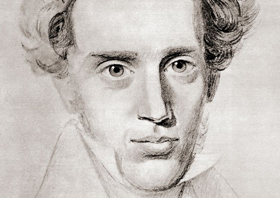|
Axios reports there are "existential stakes" in the debate over voting rights. Then, too, Axios tells us that Covid "has presented an existential challenge to live music."
Existential means relating to human existence and experience, so it could be said that all the above are existential applications of the term, whose first known appearance was in 1656. Thing is, most uses of existential are extraneous, which helps explain why the overuse is grating.
 In writing about the film "The Card Counter," Michael Ordoña of the Los Angeles Times cited an "existential hero" as well as "existential dread." In writing about the film "The Card Counter," Michael Ordoña of the Los Angeles Times cited an "existential hero" as well as "existential dread."
Existential, of course, is linked to existentialism, a focus of Danish philosopher Soren Kierkegaard (1813-55). As he described it, existentialism "is a rejection of all purely abstract thinking, of a purely logical or scientific philosophy; in short, a rejection of the absoluteness of reason." Thus, we find a writer for the Atlantic noting recently, "Politics seems more existential, not less." And last month Pope Francis described the Christian faith as "an existential journey."
The wordsmiths at Merriam-Webster report that "existential" began trending two years ago when then- Sen. Kamala Harris used the term in a vice-presidential debate with Mike Pence. Referring to climate change, she said it is "an existential threat to us as human beings." According to Webster, lookups of the word spiked 8,000% that night. The moderator asked Mr. Pence, "Do you believe that climate change poses an existential threat?" He said the "climate is changing" and pledged to "follow the science," but never addressed Ms. Harris's choice of adjectives.
A report in Medical News Today makes a good point: "There are times when a person may get past their existential dilemma without help, and generally, an existential crisis does not require medical intervention."
Lately, some journalists simply won't leave existential alone. The Journal had a tasty story about how the Food and Drug Administration is tossing its definition of French dressing. To the writers' credit, their report was entirely existential-free, but then Yahoo picked up the story and fashioned its own headline: "French dressing faces an existential crisis."
We are, I fear, becoming the boy who cried "Existential!"
(c) Peter Funt. This column originally appeared in The Wall Street Journal.
|
|



 In writing about the film "The Card Counter," Michael Ordoña of the Los Angeles Times cited an "existential hero" as well as "existential dread."
In writing about the film "The Card Counter," Michael Ordoña of the Los Angeles Times cited an "existential hero" as well as "existential dread."